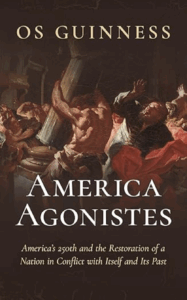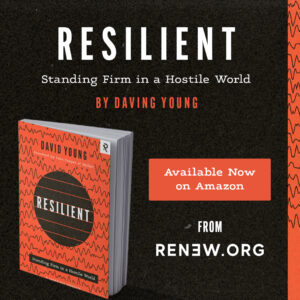September 29, 2025
In a time of deep polarization, cultural uncertainty, and spiritual drift, Os Guinness stands out as one of the most insightful voices to guide us through the challenges of our day. At RENEW.org, our mission is to renew the teachings of Jesus to fuel disciple making. We believe Dr. Guinness offers the kind of wisdom most needed for our mission in such a time as this.
Os Guinness is an internationally respected author, social critic, and cultural analyst who has written or edited more than thirty books, including The Call, Time for Truth, and The Magna Carta of Humanity, and just last week, he released his latest book, America Agonistes: America’s 250th and the Restoration of a Nation in Conflict with Itself and Its Past. Educated at Oxford, where he completed his doctorate in the social sciences, Guinness has a respected voice like few others in the evangelical world. He addresses audiences across the globe, from universities and think tanks to parliaments and business forums. Bobby Harrington conducted the interview here.
HARRINGTON: Talk about this time in history, in the recent aftermath, not only of the assassination of Charlie Kirk but also the memorial service that was held last Sunday in Arizona for Charlie Kirk, the broadcast that was witnessed by many millions. And let’s also note the negative reactions of those who are concerned about Christians being too engaged with a man who said some difficult things about race and politics.
GUINNESS: Well, Bobby, let me say thank you for having me on. We could spend a lot of time discussing the factors that led us to this moment, but let me try and summarize some of them quickly. First, we are in what’s called a civilizational moment. And that’s a period when a civilization loses touch with its inspiration. What made it great? When that happens, there are only three broad options: renewal of the inspiration, replacement (if there’s a satisfactory one), or decline. And of course, if you think of all the great civilizations, they lie in ruins and in museums and in history books. They declined, and they fell.
HARRINGTON: Tell us more.
Foundations of Western Civilization
GUINNESS: Western civilization owes a lot to the Greeks, a lot to the Romans. But there’s no question it is a Christian inspiration behind Western civilization, rooted in the Bible, rooted in Judaism. The West is a Christian civilization, and yet it’s repudiated it. And the attempted replacement, which is Enlightenment secularism, has failed. So, the West is at this crucial moment, where it either sees renewal or inevitable decline.
HARRINGTON: So, help me to understand this. The American Revolution, you’re saying, was actually driven (not perfectly, because of things like racism) by beliefs and values that go back to Deuteronomy, the Mosaic Covenant, and the Christian understanding of those things?

GUINNESS: Yes, the Plymouth founders and the earliest founders were focused on the biblical ideal. America has so many of the roots of the scriptures in its foundation, and it’s tragic that many, many Christians don’t know it.
HARRINGTON: Yes, many Americans look back and see racism, misogyny, violence, and other aspects of American history and so have written off the Judeo-Christian foundations of America. Historians are saying that these things are not merely flaws, but that they’re actually at the core of America.
GUINNESS: No, you’re exactly right, but they are wrong on our foundations. If people think for a moment, all of us are rotten sinners. If you expected me to be perfect, or I expected you to be perfect, that wouldn’t be a biblical idea at all. That’s utopian nonsense. I’m a wretched sinner. And thank God for forgiveness and the cross and the opportunity of a second chance.
“If you expected me to be perfect, or I expected you to be perfect, that wouldn’t be a biblical idea at all. That’s utopian nonsense.”
Now, there’s no doubt that slavery, which was not dealt with because of the Southern states, became a huge contradiction, not only of the gospel and the scriptures, but of the American ideals. And that’s tragic. That’s why the left wing, radical Marxism, and so on, has made hay with that.
But they’ve thrown out the baby with the bathwater. We need to confess what’s wrong and put it right. And the tragedy is that Martin Luther King and his generation did so much!
HARRINGTON: Yes, some good progress was made.
GUINNESS: They sought to tackle the real problems, but the problems remained unresolved. And then came the radical Marxists, the neo-Marxists, the cultural Marxists, they’ve made hay with those contradictions, and they have tried to wipe out the whole gospel impact on the founding of America. That’s tragic, and so many Christians, without realizing it, have gone along with it.
How Not to Make America Great Again
HARRINGTON: Okay, so here we are, in 2025. We have just witnessed an election that a lot of people are very happy about, with the mantra “Make America Great Again.” And we might view that as a reaction against some of the leftist ideals in cultural Marxism and intersectional feminism, etc. How should we make sense of what has happened?
GUINNESS: So, from the 1960s right through today, you’ve seen the growth of the radical left, and what’s called cultural Marxism. Not classical Marxism, but cultural Marxism. And that’s what’s burst through in the culture. We see influence from the French Revolution as well as links with radical Islamism coming out of the Middle East, such that they formed a very dangerous alliance. And this is what’s woken so many Christians up.
Meanwhile, people have talked about going back—”Make America Great Again.” Yet they never say what made it great in the first place. They might be thinking the economy and so on. Now, what made America great in the first place was actually a matter of ideas which came from the Bible through the Reformation and shaped the early Americans. So, we’ve got to say, it’s not enough just to say, “Make America great again.” And the danger on the conservative side is they are trying to do it simply by power.
“What made America great in the first place was actually a matter of ideas which came from the Bible through the Reformation and shaped the early Americans.”
HARRINGTON: The idea of many on the right, to make America great again, is the idea of economic revival. To be transparent, it’s our president telling people they’re going to be fabulously rich and wealthy. And, oftentimes, folks like Elon Musk want us to focus on the greatness of technology, how artificial intelligence and interplanetary travel are the answer. Wealth and technology. It just seems to me that that is no more biblical, and in fact they are illusory idols as much as cultural Marxism or intersectional feminism is an idol.
GUINNESS: No, you’re exactly right. You’re exactly right. And you can see that Musk’s wielding the chainsaw was an expression of raw power. Now, there’s no doubt that much of the bureaucracy in Washington is bloated and manned by people from the left, from the radical movement. But you can’t just beat them by power alone, where it’s just power against power. The world’s danger is unbridled power.
HARRINGTON: So the danger is idolizing power, whether on the left or the right?
GUINNESS: Nietzsche prophesied this. And you can see that the Christian view is very, very different. The cross is the contradiction of pagan, sinful power alone. And you can see how different the cross is. Then you have recent converts, like, say, Tom Holland, who wrote the book Dominion. People ask him, well, did you come to Christ through the resurrection? No, Holland came through the cross. He was humbled and brought to his knees by seeing the way the cross works in cancelling human arrogant power. It works in a very, very different way. Philippians 2, and so on. So, you’re exactly right. But we’ve got problems on both the right and the left, and Christians have got to see it.
What Are Christians to Do with Trump?
HARRINGTON: What do you make of the Charlie Kirk Memorial Service?
GUINNESS: His wife was magnificent in her forgiveness. And then immediately the president says, I’m not going that way. “I hate my opponents.” The president’s done a lot of good things. But what makes him tick is not the gospel. And we had better be very clear about that. As Christians, we represent the gospel, the Bible. And it’s a very radical, upside-down way of doing things in terms of power. And so, we thank God that Trump has nullified much of the left. But he’s done it in ways that may create a greater rebound. And then the rebound will be against the Christians who’ve supported him uncritically.
HARRINGTON: How should we think about Trump?
GUINNESS: On a lot of things, we’ve got to say, “Thank you, Mr. President,” when he’s right, and “Sorry, Mr. President, you’re wrong here, and you’ve got to do it differently,” so that we’re not caught up in his stream. Otherwise, when the backlash comes against Trump, which it will, then Christians are going to get the backlash, too.
“As Christians, we represent the gospel, the Bible. And it’s a very radical, upside-down way of doing things in terms of power.”
HARRINGTON: So, what is your advice for Christian leaders who are trying to keep Christians united when we’re so divided? You have God-fearing, Bible-loving people who are so happy about Trump and the MAGA thing, and yet you have other godly people who are so concerned about Trump. In some cases, there was a strong outcry of support for the ways of Jesus that Charlie Kirk articulated. But there were others who weren’t so happy about Kirk’s legacy, especially our African American brothers and those who are especially concerned about Trump. So, what’s your advice for Christian leaders in terms of how to handle this?
GUINNESS: Well, I’d first start by saying we are the followers of Jesus and not any political party. If you look at American history, the first thing to say about politics is that politics is not the first thing. In other words, freedom flourishes when we prioritize faith, the family, and the school. Those are the three institutions that keep freedom healthy. Again: faith, family, and school. And when we put those first, then politics will follow. Politics is secondary.
HARRINGTON: And the great danger of our time, and it came from the left first, is so-called “politicization,” everything being turned into a political issue.
GUINNESS: Now, that doesn’t mean we get out of politics. Rather, it means that Christ is first; the Bible is first. And we need to have a lot of good biblical teaching, including from Exodus, Deuteronomy, and the prophets, so that we really have a biblical view. We don’t want to be sucked into a politicized version from either the right or the left, conservatives or liberals, because both can be extreme. We are Christ followers, first and last. And everything must be critiqued in that light.
“We don’t want to be sucked into a politicized version from either the right or the left, conservatives or liberals, because both can be extreme. We are Christ followers, first and last.”
We’ve got to be humble too, and as far as we can be, gracious. No, this is no time for a sort of voice that is almost violent. When words break down, violence is never far away. You can see that in Genesis. You see it with Cain and Abel. When words broke down, Abel was murdered. That lesson is being played out in a big way today, and that’s tragic. Again and again, people said about the recent violence, whether it’s Charlie Kirk or whatever, this is un-American.
I’m sorry, I have to say, in the light of your history, it’s all too American. Again and again, it’s when words break down. We as followers of Jesus have a high view of words. We don’t weaponize words for their own sake. And a lot of Christians on the conservative side need to watch their language. Just as they certainly do on the left.
Arguing for Truth
HARRINGTON: So, what you’re saying is, there are temptations in our time, especially for Christians who crave more political power, of aligning their Christianity with a political movement. Be careful of your words, be careful of your assumptions, because you could lose the historic Christian faith in the process. And one day, when the political power switches, it’s so easy for the political power to be used against you. Is that what you’re saying?
GUINNESS: Yes. Now, there are times we’ve got to take sides. But we’ve got to argue on behalf of truth. You have to argue for the truth, not for power or victory. If we are arguing for truth, whoever wins, everybody wins. If we argue for sheer power and putting the other side down, whoever wins, everybody loses.
HARRINGTON: Yes.
GUINNESS: And we’ve got to be very clear how we do it. Truth with love, and so on. And this means we need good Christian persuasion, apologetics. It can be good to raise questions and not always make statements, but this is a time for us to be more Christian in every principle and practice. Because everything’s being called into question today.
“If we are arguing for truth, whoever wins, everybody wins. If we argue for sheer power and putting the other side down, whoever wins, everybody loses.”
HARRINGTON: Yes, let me ask you this: Let’s say I’m a pastor watching or reading this interview, and I’m thinking, I agree with you. We don’t want to be too aligned with Trump. But the people in my church are pressuring me to be more enthusiastic about Trump’s agenda—or the people in my church are pressuring me to denounce Trump. What would you say to those pastors?
GUINNESS: I would say preach the Word. And show how to apply it—but don’t do all the application. Make your laypeople do application. I’m a layperson. I don’t expect the pulpit to tell me how I’m to vote, for example. The pulpit should be sending out the biblical principles. A lot of church leaders have become too politicized, but equally, some have become so apolitical that their churches have little to no impact, in that they’re not salty or light-bearing. And it’s equally tragic the number of evangelicals who don’t vote. That’s a scandal!
Pressurized Pastoral Expectations
HARRINGTON: You know, most of the ministers/pastors in our network are going to address the big issues—LGBTQ issues, racism, abortion, and so on—from biblical convictions, and they’re going to do it tastefully. But what often happens is pastors are afraid to also call out vices from the political side that most of their people are coming from. For example, addressing what Trump said about a lack of forgiveness and hating his enemies. And they’re afraid to be even-handed like that, but it seems to me that you’ve got to be even-handed. If Scripture is our final authority, then it stands over both parties.
GUINNESS: Absolutely, Bobby, you’re dead right. In other words, they are the guardians and the spokesmen of the Word. The culture needs the Word, and that addresses both parties and all voters. And where Mr. Trump is right, we say thank God for Donald Trump. I would hazard a guess that I would agree with 75% of what he does. But there’s 25% of what he does which I find quite appalling. And you saw a very clear example in Charlie Kirk’s memorial. Erica was magnificently forgiving; it was truly biblical. And Trump immediately followed it by contradicting it.
“The culture needs the Word, and that addresses both parties and all voters.”
 HARRINGTON: There are definitely church leaders who feel they can’t ever speak both ways. Some church leaders have been feeling pressure never to say anything negative about Trump. More recently, other church leaders have been feeling pressure to never say anything positive about Charlie Kirk—even though, along with his political presentations, he was sharing the gospel on college campuses. Again, I think you’ve got to be even-handed. As you said, preach the Word, even as it addresses both parties and all voters.
HARRINGTON: There are definitely church leaders who feel they can’t ever speak both ways. Some church leaders have been feeling pressure never to say anything negative about Trump. More recently, other church leaders have been feeling pressure to never say anything positive about Charlie Kirk—even though, along with his political presentations, he was sharing the gospel on college campuses. Again, I think you’ve got to be even-handed. As you said, preach the Word, even as it addresses both parties and all voters.
GUINNESS: And when you have people who are openly opposed to you and you know it, raise questions. Don’t make statements. Raise questions that burrow into people’s minds, and they go home, and they think about it, and they come out to a different position. The pastor shouldn’t be spelling it out all the time. It’s for the lay people listening to the pastor to discern how to vote, how to speak, etc. That’s their responsibility.
Nationalism, Globalism, Totalitarianism?
HARRINGTON: Os, even as you advocate against politicization and for preaching biblical principles not party platforms, people are still going to accuse you of bringing Christianity too close to politics. They’re going to be very nervous when you point to Judeo-Christian foundations as inspiration for Western civilization. What do you say when people say that you must be a “Christian nationalist”?
GUINNESS: You know, I often go back to George Orwell who pointed out the difference between patriotism and nationalism. Patriotism is the love of the country in which you were born and/or in which you live. Patriotism is natural and human. Nationalism is “my country, right or wrong.” In other words, nationalism easily becomes an idol. Let’s put that in biblical terms. We love our family, yet none of our families are perfect. We love our nation, yet none of them are perfect. So, we’re not nationalists, but we are patriots. We thank God for our countries. And, you know, the Enlightenment idea that we’re universal citizens, globalists, John Lennon’s “Imagine,” and all this sort of nonsense, it’s unrealistic.
HARRINGTON: Explain what you mean when you say that love is particular.
GUINNESS: I love a particular woman, my wife. You love your wife. I love my family, and you your family. Love is particular, and love of the country is particular. So, you can love your own country. That’s patriotism. But that doesn’t mean “my country, right or wrong.” No, it means I love it, and where it’s wrong, I speak out against it.
Now, I would add to that, Bobby, that the critique that we evangelicals are Christian nationalists is often unfair, and that the critique often comes from a globalist perspective.
“The critique that we evangelicals are Christian nationalists is often unfair, and that the critique often comes from a globalist perspective.”
We should be patriots. We all belong somewhere. Every human needs three things: meaning, belonging, and purpose. As for meaning, our Christian faith gives us a view of the world. As for belonging, we’re members of the church, and we’re also citizens of a country. As for purpose, we each have a calling.
Now, any of those can be made into idols. Calling can be very dangerous if it’s made into an idol. Manifest destiny, and so on. But the biblical roots of it are so wonderful. We need meaning, belonging, and purpose. So, patriotism, good. Of the tendency toward nationalism, be careful. But be even more careful of the globalists. We’re patriots. We’re not nationalists. And we’re certainly not globalists.
HARRINGTON: Sometimes I’ve wondered if, those who are progressive on the left have adopted or developed more of a religious tone or religious devotion to their philosophy, which is actually a combination of philosophies. That they are religious and they label those on the right to be Christian nationalist because they sense they are fighting against our Judeo-Christian heritage and it is their religious perspective against ours.
GUINNESS: No, you’re exactly right. You’re exactly right. And they will use any slur they can to put us down. And often, the Christian nationalism accusation is in the light of their secular globalism. And that’s even more dangerous, because that will lead to a one-world government and global authoritarianism. The great danger in the world today is unbridled power—which will lead to authoritarianism, and then to totalitarianism. The foundational Judeo-Christian principles that framed Western civilization is the only solid answer.












2 Responses
Thank you for this conversation. A Canadian and Brit who’ve embraced America as their home, this is a much-needed and often lacking “outsiders’ perspective” from the commonwealth. Os is exactly right about the inevitable backlash from this moment. Biblically orthodox Christians who happen to reside in the United States had better be prayerfully, and only then critically, engaged in this “civilizational moment.”
I was glad to see this dialogue openly exploring the deep and dangerous polarization among Christians in the US blended with polarization of US politics. There are great political differences regarding policies and objectives. As was pointed out, the appropriate path to resolve those differences calls for open dialogue which respects the concerns and opinions of the other side.
However, I wish the dialogue had further explored the relevance of personal integrity and character (or lack thereof) in this polarization. The teachings of Jesus and the Bible make it clear that integrity, character, and obedience to God and Jesus are essential elements of being a disciple of Christ, of being a Christian.
When anyone (whether an individual, a church, or a leader) rejects or ignores the plain teachings and authority of Christ, they are rejecting Christ and thus are not true disciples of Christ – regardless of any claim they might make. They are sowing division for selfish motives (Rom 16:17-18; I Cor 1:10; and 1 Cor 3:3). They should be marked as such and avoided, and certainly not followed.
Today’s political communications are saturated with far too much lying, hatred, revenge, bullying, greed, lust for power, arrogance, chaos, etc. Such things are directly opposite to the plain and specific teachings of Jesus. They demonstrate a severe lack of integrity and character. Perhaps such characteristics might not be unusual among politicians who do not profess to be Christians. But integrity and good character ought to be prerequisites for elected officials in US government, because of the power and influence they have over the citizenry and the well-being of our country.
I would argue that the vote and political endorsement by each Christian should take into account at least two major aspects. One aspect is the stated policies and goals of both the candidate and the party. The other, and I think more important, aspect takes into account the moral integrity and character of the candidate, the track record of promises kept or broken, and the ethics and fairness with which goals are pursued.
There are no perfect people, and there are no perfect politicians. There are many examples of politicians who fall short in these areas. But this year the character flaws seems far more egregious, flagrant, and blatant. Many prominent officials seem to be proud of their bad behavior.
A recent article by Shadi Hamid in the Washington Post, 2 Versions of Christianity Battle for America’s Soul, clearly describes the growing partisan divide among Christians in America.
Hamid’s religion is Islam. His non-Christian perspective on American Christianity is very insightful, perhaps clearer than that of most Christians in America. Here are a few excerpts. “Millions of Trump-supporting Christians now seem to question whether Jesus’ own teachings on forgiving and loving one’s enemies are even relevant today. The reasoning is simple. Because the American Way and Western civilization are facing off against a depraved and even demonic left, Jesus’s admonitions in the Sermon on the Mount no longer apply.”
He quotes Michael Wear, “the result is that immoral tactics are justified by the morality of the pursued outcome” because “the opposition is so evil and the political outcome is so paramount.”
Hamid says the Charlie Kirk memorial service “wasn’t so much Christianity shaping politics but politics reshaping Christianity. The question is no longer whether faith should influence political life but whether political life has so thoroughly captured faith itself.” “The two dueling views that divided the memorial service also divide the nation. They cut to the very heart of what it means to be a Christian in America today.”
I am reminded of Satan’s persuasion of Eve in the Garden as he twisted what God had said in order to persuade her that it was better for her to disobey what God had said. That did not turn out well for Eve, Adam, and all of mankind. Satan seems to be using a similar approach today to persuade many people to disobey God’s instructions.
Satan is seeking to nullify Jesus’ prayer in John 17:20-23 for His followers to “be brought to complete unity. Then the world will know that you sent me and have loved them even as you have loved me.”
I personally know quite a few non-Christians who now live in the US after having been invited here by the US. It is perplexing for them to see and hear the violations of Jesus’ commands by people who claim to be Christians. They had heard America is a Christian nation. Is what they now see the reality of Christianity?
And what about the vast number of Americans who do not consider themselves Christians? How can they know that God sent Jesus and loves them?